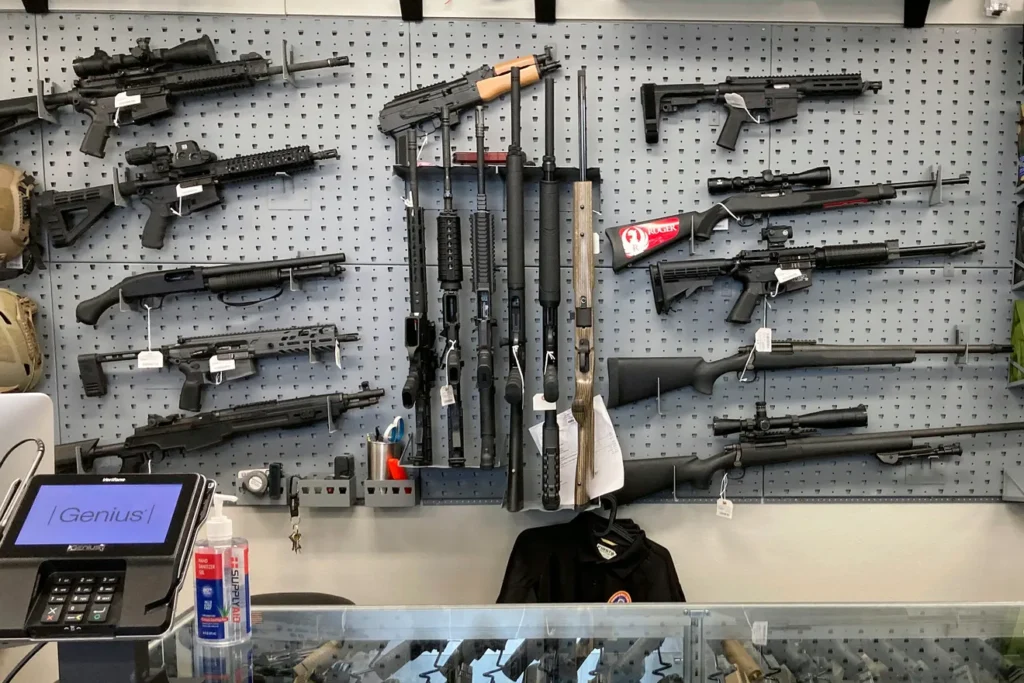This article first appeared here on HeraldMailMedia.com
ANNAPOLIS — The General Assembly is making gun control a priority this year, after the U.S. Supreme Court in June struck down gun permit restrictions similar to Maryland’s. The Gun Safety Act of 2023 is speeding through the legislative process with a second hearing scheduled for Feb. 7, and at least two other bills are pending.
The act, SB 0001, is expected to cause heated debate. Sen. Jeff Waldstreicher, D-Montgomery, and then-Sen. Susan Lee, D-Montgomery, who recently was appointed Secretary of State, sponsored the bill.
The proposal would prohibit an individual from knowingly wearing, carrying or transporting a firearm onto another person’s property without consent. It would also prohibit anyone from wearing, carrying or transporting a firearm within 100 feet of certain places of public accommodation, specifically “sensitive” places, such as restaurants, lodging areas, stadiums or retailers, according to the filed bill.
Lawmakers said The Gun Safety Act will fill the void in gun control that formed following the Supreme Court’s decision in NYSRPA v. Bruen. The court decided that law-abiding citizens do not need a “good and substantial” reason to be permitted to carry a concealed weapon and that this “proper cause to carry” requirement, used in several states, including Maryland, was unconstitutional according to the 14th Amendment.
“The Bruen decision gets rid of Maryland’s ‘good and substantial’ requirements in order to own and possess a handgun,” said Waldstreicher. “By eliminating that requirement, now anyone can get a gun and bring it anywhere. That is unacceptable and creates a tremendous danger in our state…
“It has forced our hand here in the legislature, and we need to act.”
Maryland sees big jump in gun permit applications
From 2018 to 2021, the Maryland State Police, on average, approved 13,000 to 14,000 handgun permit applications per year, according to Cpl. Josh Taylor, supervisor of the handgun permit group. From June 23, 2022, to Dec. 31, 2022, (post-Bruen), the number of permits approved boomed to over 80,000, once the proper cause requirement was overturned.
Moms Demand Action, a grassroots movement advocating for stronger gun laws, said that The Gun Safety Act will greatly benefit public safety in the aftermath of the Bruen decision.
“Maryland is now left with no choice in the wake of the Supreme Court’s dangerous decision, to address what they want to do about the question of public carry,” Everytown for Gun Safety Regional Legal Director Sam Levy told Capital News Service. “There’s simply going to be more people carrying guns in public, and Maryland now has to do whatever they can to mitigate those risks.”
Everytown and Moms Demand Action are affiliated.
The gun control advocates plan a Tuesday rally in Annapolis with Students Demand Action volunteers. They will meet with local lawmakers, including Waldstreicher, and Senate Judicial Proceedings Chairman Will Smith, D-Montgomery, to discuss strengthening gun laws, including concealed carry laws such as The Gun Safety Act.
“The purpose of these types of place location laws is to identify locations where, for example, alcohol is being served, where people’s judgment is likely to be impaired,” said Levy. “Keeping guns out of sensitive places like bars, stadiums, courthouses, polling places, address a whole number of potential threats, not just mass shootings.”
Waldstreicher said that’s exactly right, guns don’t belong in certain places, like hospitals, government buildings, parks and restaurants.
“Any fender bender could turn into gun violence; any dispute over a check at a restaurant can turn into gun violence,” said Waldstreicher. “When guns are everywhere, we are less safe.”
Gun advocacy groups oppose new Maryland measure
Not everyone said the bill would increase public safety. The bill faces opposition from gun advocacy groups, who said it will punish law-abiding gun permit owners.
“It would adversely affect public safety. It certainly would adversely affect the rights of concealed carry permit holders to be able to protect themselves,” said Mark Pennak, president of Maryland Shall Issue, a Maryland gun rights group. “It will have no effect on actually promoting public safety because everyone agrees — permit holders do not commit crimes.”
The constitutionality of The Gun Safety Act is also being questioned in the wake of the Bruen decision. Since Bruen, states such as New Jersey and New York have proposed gun legislation similar to The Gun Safety Act, limiting where permit holders may carry weapons. Both of these proposed bills are held up by district courts over constitutional questions.
“It is so plainly contrary to how the Supreme Court ruled in Bruen that it effectively denies the right to public safety in all urban and many rural areas in Maryland,” said Pennak. “This area doesn’t even begin to qualify as a sensitive area under the Supreme Court’s ruling, so it’s dead on arrival, because if it does pass, we will bring suit, and it will fail.”
The proposal is also facing a pushback from GOP lawmakers,
The proposal is also facing a pushback from GOP lawmakers, including Sen. Mary Beth Carozza, R-38, who sent this statement to The Daily Times:
“I strongly oppose Senate Bill 1 as it prohibits someone with a Concealed Carry permit from carrying in any place of public accommodation. Last June, the Supreme Court ruled that law-abiding citizens were no longer required to provide a ‘good and substantial reason’ to carry a firearm in public to protect themselves.
“Now about six months later, certain lawmakers in the Maryland General Assembly are targeting law-abiding citizens, and attempting to take that right away. The Maryland General Assembly should focus on passing legislation that increases the penalties for repeat violent offenders using guns and other weapons, not targeting those who just want to legally practice their 2nd Amendment rights.”
State Sen. Mike McKay has also voiced his opposition
“Senate Bill 1 … will severely restrict any person’s right to carry a weapon in Maryland. This is greatly concerning, and I will be sure to do everything in my control to not let it pass,” said McKay, R-Garrett/Allegany/Washington in his “We’re here in Annapolis now” letter.
Mass shootings drive move for more measures
Despite criticisms, Waldstreicher remains confident that his bill is strong enough to withstand examination.
“Mark Pennak is a constituent, and I respect his point of view even though I disagree with it,” said Waldstreicher. “What Mark doesn’t say is that no appellate court has ruled on similar laws from other states, so I am optimistic that we can draft a bill that will both provide for public safety and withstand constitutional scrutiny.”
Sen. Jill Carter, D-Baltimore City, member of the Judicial Proceedings Committee, said that further distinctions must be made to decipher which public places qualify as sensitive.
“I can certainly understand the lack of permission if someone has private property and they don’t want it there; they have every right to prohibit it,” said Carter. “However, I think that we are going to have some conversations about the 100 feet within public accommodations because that’s very broad.”
The Gun Safety Act is not the only gun reform proposal this legislative session. Gun violence remains a pressing issue, particularly with 41 mass shootings occurring between Jan. 1 and Jan. 26, according to national data from the Gun Violence Archive. The archive defines a mass shooting as a minimum of four people shot, either killed or injured, excluding the shooter.
Waldstreicher has also proposed the Raise the Age Act of 2023, SB 86, which will also be heard on Feb. 7. The bill would prohibit individuals under 21 from possessing a rifle or shotgun, except under certain circumstances. It also would prohibit selling, renting, or transferring certain ammunition to anyone under 21.
In the House, Delegate J. Sandy Bartlett, D-Anne Arundel, proposed HB 0003, which concerns firearms surrendered under final protective orders. This bill would alter the purpose of the Maryland State Police Gun Center to include tracking, screening and vetting of firearms surrendered under final protective orders.
It would also require reporting the number and type of firearms surrendered, the jurisdictions, and specific information regarding the individual who surrendered the weapon. It is pending.

